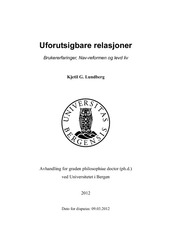| dc.description.abstract | This Ph.D. dissertation is a study of the experiences users have with the Norwegianemployment and welfare administration in the context of a major reform process. TheNav reform is the largest reform in the recent history of Norwegian publicadministration. The concern for the needs of the users played a central part in how theNav reform was legitimated, and the reform was intended to “put the user in thecenter.” The reform goal was to get more people off welfare and into work oractivation, to give better and more user friendly services, and to make the employmentand welfare administration more efficient. The overarching goal of my project hasbeen – through the experiences of the users – to explore the nature of the user/Navrelation. While there is a relatively extensive body of research on the reformimplementation process in itself, as well as on the employees of the organization,there has been a lack of thorough studies of the group the intentions of the reform wasaimed at – the users.The study is based on qualitative interviews with 29 users receiving long term sickleave benefits, long term unemployment benefits or rehabilitation allowances. Thedata is analyzed to locate and describe the problems in people’s lives that lead them toapproach Nav for help, and the impressions they have with their experiences with theNav system. It also explores the users’ agency in their relation to Nav, and therelationship between the interviewees’ work ethic and the range of opportunity andlimitation they face with regards to e.g. employment.As complimentary data, I use field observations from the lobby of a local Nav officeto analyze interaction in this setting. The interview data is approached and analyzed asaccounts of users’ experiences. The analysis is given direction through a wide scopeof theoretical influences, but I have especially made use of the institutionalethnography developed by Dorothy Smith. The study is also anchored in Norwegianand international research on welfare, public administration, “bureaucraticencounters,” and the relationship between the state and its citizens. The study finds that the handling and outcome of a request for help from Navconcerning the kind of issues that the group in question have, are complex, andinterwoven in different contexts such as health care systems, working environmentissues and labor market relations.People value work highly, but when their health is weakened they need to find waysto balance work with their overall life situation. Nav comes across to the intervieweesas a large and fragmented administration. They meet, and must relate to, a lot ofdifferent Nav employees and organizational units. They thus get to know a set ofdifferent (and sometimes contradictory) ways of doing things. Often, the users have toattempt to control and coordinate the different units and levels of Nav themselves,which often leads to diverging and/or belated outcomes. Users develop strategies fordealing with Nav, and some lean on their personal abilities or bureaucraticcompetencies which they can mobilize in their relation with the system. The user/Navrelation is characterized by a tension between help and control. It is important to notethat for the users these are emotional and important relations, as they determine theiropportunities for income security (and the extent of this), as well as how they will bemade to or able to spend their time. It is also an issue of categorization and diagnose –and thus about their own identity.The local Nav office was meant to be at the core of the Nav reform, and was frontedas a “one stop shop.” In my analysis of users’ experiences, a different image emerges.The local Nav office is a street level bureaucracy, but the other parts of Nav that theusers’ need to deal with, such as case work units, on-line solutions and private servicecontractors providing services to Nav, follow different logics. The study indicates thatthe fragmented system the users are experiencing seems to stand in opposition to anefficient activation policy as well as a user friendly system. Given all the agentsinvolved, and the unpredictability of the relations, this will put the Norwegian welfaresystem to new tests. | en_US |
